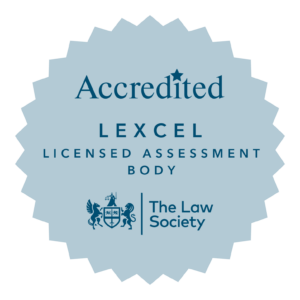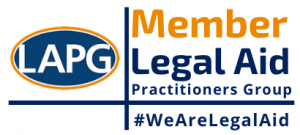LASPO four years on….
It has been four years since the Legal Aid Sentencing and Punishment of Offenders Act 2012 (also known as LASPO) was introduced. The bill for the Act was introduced in the House of Commons on 21 June 2011, and received Royal Assent on 1 May 2012. The controversial Act had shaken the foundations of Legal Aid.
Previously Legal Aid was available in a number of different areas of the law and open to those on low incomes. The availability of Legal Aid was drastically changed. Legal Aid is now no longer available/limited in the following areas of the law:
– Private Family Law (such as divorce and child arrangements)
– Clinical Negligence
– Employment Law
– Non-asylum Immigration Law (Where the person is not detained)
– Debt
– Housing
– Welfare Benefit issues
The Law Society conducted their own review of LASPO in June 2017, and made a number of recommendations. In this article I will focus on the aspects relating to family law.
LASPO directly and indirectly affecting children
When LASPO was introduced it was envisioned by the government that it would not impact on children and their welfare. The Law Society in their report have outlined how this is not the case.
Directly affecting children –
The following are instances in which The Law Society considers that children’s safeguarding is at risk:
– When children are living in an official private fostering arrangement and often under the care of adults who wish to exploit them.
– Children in cross border adoption arrangements.
– Children who have been trafficked but not officially recognised as such.
– Children with unresolved immigration issues following the death of a parent family break up.
– Stateless children born in the UK without having their status regularised.
Indirectly affecting children –
LASPO has indirectly affected children in instances where Specials Guardianship Orders (SGO) are being sought in relation to the child.
• Where the Local Authority have not issued care proceedings, and someone has applied for a SGO, the parents are at risk of having their child/ren removed. As the Local Authority are not involved this would be private family law proceedings, and therefore would be subject to the means and merits testing, and gateway evidence would be required.
In instances where the person applying for a SGO, a family member whom the child would be better off in the care of, and there are no care proceedings started, the Applicant would also be subject to the Legal Aid means and merits test.
In circumstances where care proceedings have been issued by the Local Authority both parents would be eligible for non-means and non-merits tested Legal Aid. A family member who is positively assessed to be a Special Guardian who wishes to have legal advice would be means assessed. Therefore, those who are on low incomes but do not pass the capital means assessment would be priced outside of Legal Aid eligibility.
Two ways the prospective Special Guardian could get legal advice in these circumstances are as follows:
(1) Where the prospective Special Guardian, who is not party to the proceedings, has a fixed amount of funding from the Local Authority to get legal advice. The funding in these circumstances would be very limited.
(2) Where the prospective Special Guardian, is made party to the care proceedings, and has parental responsibility for the child/ren the Legal Aid test would be non-means and non-merits tested.
The Law Society in their review has made the recommendation that the Government should reinstate Legal Aid for parties involved in Special Guardianship Order applications.
Civil Legal Aid income cap and capital means assessment
When LASPO was introduced in 2013 the maximum cap on income was £2,657 a month, for a family with up to 4 dependants. This cap has not increased since 2013 or considered inflation. This mean that the rising cost of living has not been taken into account. This makes access to legal advice evermore unaffordable for those on a low income, as they are unable to afford to pay privately.
The Law Society has recommended that civil legal aid means test should be reviewed and updated to reflect current levels of inflation and changes in cost of living.
Domestic violence gateway evidence
LASPO has removed Legal Aid for all private law family cases. That is unless you could produce evidence of domestic violence or child abuse is provided. The government introduced such a restriction to ensure that victims of domestic violence, or where a child is at risk of abuse, would still have access to Legal Aid.
A two-year time limit was imposed on the evidence of domestic violence. This meant that the Legal Aid applicants would need to evidence they were victims of domestic violence or that there was child abuse within the previous 2 years. This received scrutiny from the public as it was too stringent. The government in response extended the time limit to 5 years.
The Law Society recommended in their review of LASPO that there should not be any time limit.
There is a prescribed list of evidence to satisfy this gateway evidence. Below are some examples of possible gateway evidence:
• Injunction or protective order against domestic violence or child abuse.
• The other party being convicted of violent or abusive offence towards to applicant, or child abuse.
• On-going criminal proceedings for domestic violence, or child abuse, by the other party towards the applicant.
• Victim referred to a Multi-Agency Risk Assessment Conference, and a plan put in place to protect the victim.
• Findings of fact in family courts of domestic violence, or child abuse, from the other party.
• Letter from refuge.
• Letter/ report from a medical professional, such as a GP.
• Letter from social services stating the applicant is a victim of domestic violence against the other party, or the child is at risk of child abuse.
Applicants have found it difficult to obtain such evidence. It could be because they were too scared, this is mainly due to victims not taking incidences of domestic violence or child abuse far enough to report to police or social services.
Time and time again when clients are assessed for Legal Aid they are unaware of the requirement of such evidence and are unfortunately turned away. People often are not prepared with such evidence to hand which can cause problems where the person needs urgent legal advice. To many, it is disheartening being turned away for such a reason after finally getting the courage to seek help.
The Law Society has recommended that frontline domestic violence support organisations should be able to confirm that individuals are victims of domestic violence. This is in the hope that people will come forward to these neutral organisations about the domestic violence.
Litigants in Person
It is well known that LASPO has led to more people becoming Litigants in Person. Due to their lack of experience in the legal arena and knowledge of the law, Litigants in Person cost the courts more money. Therefore, although LASPO was introduced to find a way to reduce the cost to the public funds, it does still incur costs on the court, and the public purse, in another way.
Government’s review of LASPO
At an All Party Parliamentary Groups meeting on 17 January 2017 the Justice Minister, Sir Oliver Heald QC, had announced that by April 2018 the Government will be conducting a post-implementation review. Sir Heald stated “enough time has now passed for reforms to bed in and can begin the review process”. At the meeting it was briefly set out how the review would be conducted. The Ministry of Justice would submit a post-legislative memorandum on LASPO, as a whole, to the Justice Select Committee before May 2018. The memorandum will look at the Acts implementation on litigation and various reviews undertaken by NAO and others. After which, an initial assessment to see whether the changes have met the Government’s objectives. The Ministry of Justice will then do a full post implementation review.
During the Q&A session Sir Heald stated that the details as to who would be conducting the review and who would be consulted would be announced when the post-implementation memorandum was presented to the Justice Select Committee.
We look forward to seeing what the Government’s review will include in the new year.
The full report from the Law Society is available here.
The minutes from the All Party Parliamentary Groups on 17 January 2017 can be found here.
This article was prepared by Buncy Pankhania. Buncy is paralegal to Deborah Marsden


